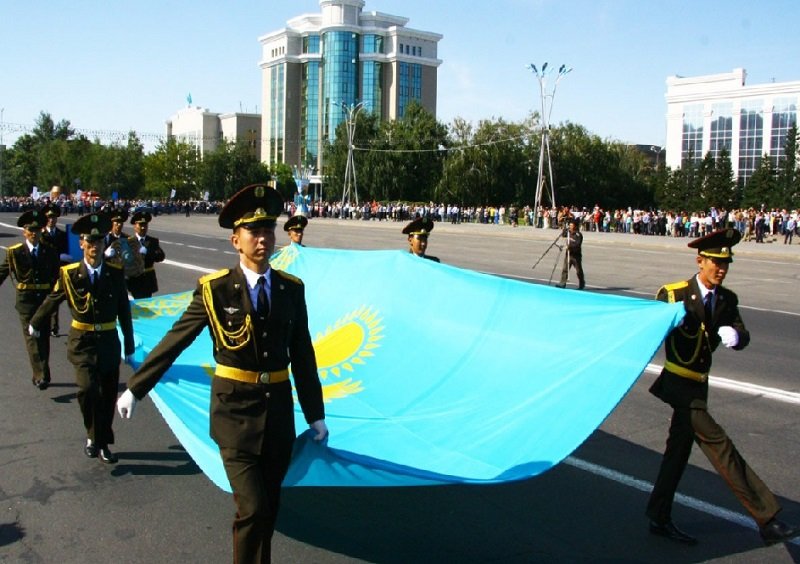Kazakhstan celebrates its 31st year as an independent and sovereign state, marking more than three decades since the Caspian and Central Asia regions' nation became independent from more than 70 years of Soviet rule.
What is now known as Kazakhstan’s Independence Day, the country’s most beloved national holiday, with millions of Kazakhstanis coming together to celebrate the anniversary of the rebirth of their state. While December 16th officially marks Independence Day, celebrations take place on both the 16th and 17th.
December 16, 1991, was a prominent day in Kazakh history, as the country’s Supreme Council passed the Constitutional Independence Law, which, together with the Declaration of Sovereignty established what is now considered Central Asia’s wealthiest country.
The document ushered in the era of Nursultan Nazarbayev, who was elected the first president of Kazakhstan in 1991. The country’s new two-house parliamentary system and national Armed Forces were subsequently established to meet the needs of defense. The capital city, which is now the country’s landmark, was moved from Almaty to Astana in 1997.
Lying in the north-central part of the country, along the Ishim River, at the junction of the Trans-Kazakhstan and South Siberian railways, Astana was given the name Nur-Sultan in honor of the country's first president, Nursultan Nazarbayev, who had resigned after nearly 30 years in power. The name was changed back to Astana in September 2022.
Kazakhstan was the last to declare its independence despite the swift collapse of the Soviet Union, but now the country ranks first in many ways.
Since the legal beginning of Kazakhstan's movement towards true independence, the country has been a champion of non-proliferation, disarmament, and global dialogue and has advanced efforts in international peace and security.
As of today, Kazakhstan is ranked the world’s ninth-largest crude oil exporter and holds the 15th-largest amount of proven natural gas reserves. Among the post-Soviet countries, Kazakhstan owns the largest deposits of liquid hydrocarbons behind Russia. The country stepped into the global oil market in 1993 after the country’s government and Chevron agreed to establish a giant oil-production venture, Tengizchevroil, to produce oil in two big fields near the Caspian Sea. In 1997, Kazakhstan signed a production-sharing agreement with seven international companies, including Agip, British Gas, British Petroleum, Mobil, Shell, Statoil, and Total.
The country has joined the world’s most influential international organizations such as the United Nations, the Organization for Security and Co-operation in Europe, the Shanghai Cooperation Organization, the Organization of Islamic Cooperation, and the Organization of Turkic States. Kazakhstan has become the first Central Asian country to be elected to a two-year term to the Security Council, the high-profile and permanent UN body that investigates international disputes and situations that often involve global tension.
With a population of more than 19 million, the former Soviet republic is home to more than 135 ethnicities, including ethnic Kazakhs, which make up over 70 percent of the population. Russians, Uzbeks, Ukrainians, Tatars, Germans, Koreans, and Azerbaijanis are all present in the country, along with other ethnic minorities. Roughly 72 percent of Kazakhstan’s population is Muslim, while 20 percent of Kazakhstanis are Christian, predominantly Russian Orthodox. In 1995, the former Kazakh president, Nursultan Nazarbayev initiated the creation of the Assembly of People of Kazakhstan to ensure socio-political balance in the country. At first, the Assembly was an advisory body under the President, but later it was transformed into a body with socio-political status.
The brainchild of Kazakhstan’s former president Nursultan Nazarbayev, the Congress of the Leaders of World and Traditional Religions was first held in 2003 and takes place in Kazakhstan’s capital city once every three years. In Kazakhstan, a Muslim-majority country, religious traditions of various ethnic groups have become a bridge that unites various communities and builds cohesion across the country.
Meanwhile, this year’s Independence Day takes place amidst the re-election of Kassym-Jomart Tokayev as the president of Central Asia’s largest country. President Tokayev, at age 69, secured a resounding victory in the snap election on November 20, which saw him garner 81.31 percent of the votes. Tokayev, who previously served as Kazakhstan’s foreign minister, prime minister and chairman of the senate, won his first election in 2019 with the backing of his predecessor, Nursultan Nazarbayev.







 Armenian sappers commenced on Monday mine-clearance operations in the territories adjacent to the Saint Mary Church in village of Voskepar (Armenia...
Armenian sappers commenced on Monday mine-clearance operations in the territories adjacent to the Saint Mary Church in village of Voskepar (Armenia...
 Iran and Pakistan have signed eight cooperation documents in various fields, and agreed to strengthen ties to fight terrorism in the region.
Iran and Pakistan have signed eight cooperation documents in various fields, and agreed to strengthen ties to fight terrorism in the region.
 President Aliyev emphasized the critical role of the North-South Transport Corridor in fostering transport cooperation between Azerbaijan and Russi...
President Aliyev emphasized the critical role of the North-South Transport Corridor in fostering transport cooperation between Azerbaijan and Russi...



